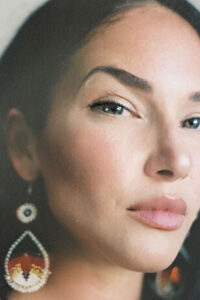
On January 15, indigenous rights activist Nikki Sanchez was on her way to New York to participate in our We Wear Fair Trade photo shoot as a model when her flight was delayed multiple times by a snowstorm. While trying to reschedule her flight at the airport to make it to the photoshoot, Nikki, who is a Maya Pipil woman, writer, environmental rights spokesperson, and decolonial educator, says she experienced a “humiliating incidence of racial profiling,” later reported on by Vice. In our interview with her a few weeks later, Nikki shared her perspective on what happened and tells us about her own fight for social justice and how it’s connected to fair trade fashion.
FTUSA: Will this situation change or influence your activism going forward?
Nikki: I never woke up one morning and said to myself, “I am going to be an activist today.” It’s been more of an ongoing struggle and evolution regarding how to strategically shift inequity and injustice that to me feels intolerable. I have never gone public the way I did with this racial profiling incident at the airport because my activism has never been about me. It’s been about dismantling structures of inequity, erasure, and exploitation so that racism, gross wealth inequity, patriarchy, genocide, and ecocide aren’t the realities we are forced to live with (or rather survive through).
I do not think I would have chosen to share my story on social media if it had not been for a horrific incidence of racial profiling that came out in the media the week before my experience. Very close to where I live, a Heiltsuk grandfather and his 12-year-old granddaughter had made an appointment at the bank so he could set up her first bank account. After seeing their Indian Status cards, the bank employee claimed the numbers didn’t add up. She took their IDs and told them to wait for her while she verified them. Instead, she called the police, accused them of fraud and the whole scene ended up with the police putting the grandfather and granddaughter in handcuffs. They were detained for over an hour but had done absolutely nothing wrong.
This is just one example of the racism that Indigenous people in Canada are facing in an era of what our political leaders call “reconciliation.” While reports can never be sure, it’s estimated that 4,000 Indigenous women, girls, and two-spirited people in my country have gone missing. Indigenous people are treated as enemies of the state when they try to live on their own territories in the way they always have. The story of the grandfather and his young granddaughter broke my heart, and what happened at the airport one week later pushed me past my breaking point. I am no longer willing to be gentle and patient in my response to systemic racism. I am a conflict-averse person, but there is a point where silence becomes complicity, and I refuse to be complicit.
FTUSA: Why do you support fair trade clothing?
Nikki: My elder and mentor Qaamina Sam comes from the Nuu-chah-nulth village of Ahousaht, on the West coast of Vancouver Island. A teaching that I have been grateful to receive from him is this: “hishuk ish tsawalk.” It means, “Everything is one, and all things are interconnected.” For me, it is impossible to understand contemporary environmental issues without also understanding the colonial worldview that created them. It is impossible to enact environmental justice without decolonization. We all have a right to clean air, water, and sustenance.
When we are courageous enough to look at our global economy with a critical social justice and environmental lens, several things become devastatingly clear: the impact that Western consumption has on the territories and communities that produce what which we consume; the number of people who live without access to clean drinking water or near toxic contamination sites; and the fact that access to basic health care and fair wages is often non-existent. I think that too often people pick and choose what issues they opt into caring about based on convenience, but you can’t just look away and pretend a system you participate in doesn’t cause harm simply because it will interrupt your lifestyle.